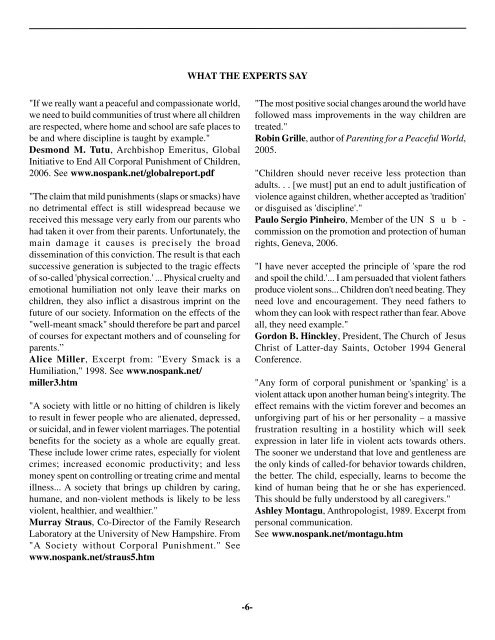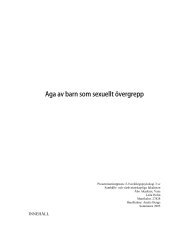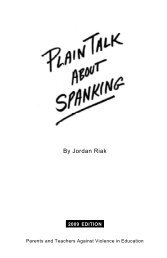Plain Talk about Spanking - Project NoSpank
Plain Talk about Spanking - Project NoSpank
Plain Talk about Spanking - Project NoSpank
Create successful ePaper yourself
Turn your PDF publications into a flip-book with our unique Google optimized e-Paper software.
"If we really want a peaceful and compassionate world,<br />
we need to build communities of trust where all children<br />
are respected, where home and school are safe places to<br />
be and where discipline is taught by example."<br />
Desmond M. Tutu, Archbishop Emeritus, Global<br />
Initiative to End All Corporal Punishment of Children,<br />
2006. See www.nospank.net/globalreport.pdf<br />
"The claim that mild punishments (slaps or smacks) have<br />
no detrimental effect is still widespread because we<br />
received this message very early from our parents who<br />
had taken it over from their parents. Unfortunately, the<br />
main damage it causes is precisely the broad<br />
dissemination of this conviction. The result is that each<br />
successive generation is subjected to the tragic effects<br />
of so-called 'physical correction.' ... Physical cruelty and<br />
emotional humiliation not only leave their marks on<br />
children, they also inflict a disastrous imprint on the<br />
future of our society. Information on the effects of the<br />
"well-meant smack" should therefore be part and parcel<br />
of courses for expectant mothers and of counseling for<br />
parents.”<br />
Alice Miller, Excerpt from: "Every Smack is a<br />
Humiliation," 1998. See www.nospank.net/<br />
miller3.htm<br />
"A society with little or no hitting of children is likely<br />
to result in fewer people who are alienated, depressed,<br />
or suicidal, and in fewer violent marriages. The potential<br />
benefits for the society as a whole are equally great.<br />
These include lower crime rates, especially for violent<br />
crimes; increased economic productivity; and less<br />
money spent on controlling or treating crime and mental<br />
illness... A society that brings up children by caring,<br />
humane, and non-violent methods is likely to be less<br />
violent, healthier, and wealthier."<br />
Murray Straus, Co-Director of the Family Research<br />
Laboratory at the University of New Hampshire. From<br />
"A Society without Corporal Punishment." See<br />
www.nospank.net/straus5.htm<br />
WHAT THE EXPERTS SAY<br />
-6-<br />
"The most positive social changes around the world have<br />
followed mass improvements in the way children are<br />
treated."<br />
Robin Grille, author of Parenting for a Peaceful World,<br />
2005.<br />
"Children should never receive less protection than<br />
adults. . . [we must] put an end to adult justification of<br />
violence against children, whether accepted as 'tradition'<br />
or disguised as 'discipline'."<br />
Paulo Sergio Pinheiro, Member of the UN S u b -<br />
commission on the promotion and protection of human<br />
rights, Geneva, 2006.<br />
"I have never accepted the principle of 'spare the rod<br />
and spoil the child.'... I am persuaded that violent fathers<br />
produce violent sons... Children don't need beating. They<br />
need love and encouragement. They need fathers to<br />
whom they can look with respect rather than fear. Above<br />
all, they need example."<br />
Gordon B. Hinckley, President, The Church of Jesus<br />
Christ of Latter-day Saints, October 1994 General<br />
Conference.<br />
"Any form of corporal punishment or 'spanking' is a<br />
violent attack upon another human being's integrity. The<br />
effect remains with the victim forever and becomes an<br />
unforgiving part of his or her personality – a massive<br />
frustration resulting in a hostility which will seek<br />
expression in later life in violent acts towards others.<br />
The sooner we understand that love and gentleness are<br />
the only kinds of called-for behavior towards children,<br />
the better. The child, especially, learns to become the<br />
kind of human being that he or she has experienced.<br />
This should be fully understood by all caregivers."<br />
Ashley Montagu, Anthropologist, 1989. Excerpt from<br />
personal communication.<br />
See www.nospank.net/montagu.htm





